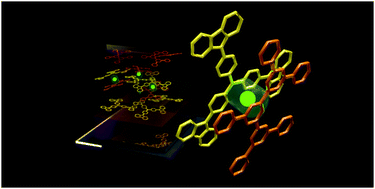Exciplexes of individual electron donor and acceptor molecules are a promising approach to utilizing otherwise non-emissive triplet states in optoelectronic applications. In this work, we synthesize a series of bis(terpyridine) pyrimidine (BTP) isomers and employ them as electron acceptors in complexes with tris(4-carbazoyl-9-ylphenyl)amine (TCTA). We show that these TCTA : BTP complexes produce thermally activated delayed fluorescence (TADF) by exciplex emission, and we investigate the influence of the nitrogen position in the pyridine on the optical and electronic properties of the exciplex. The molecular arrangement of the complex is studied using scanning tunneling microscopy (STM) as well as classical force field and density functional theory (DFT) simulations. Finally, we fabricate organic light-emitting diodes (OLEDs) with maximum external quantum efficiencies ranging between 0.5% and 2% – depending on the BTP isomer.
